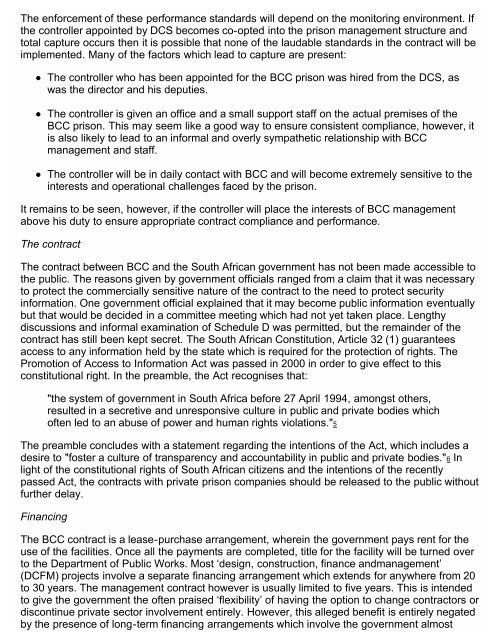prison privatisation in south africa issues, challenges and ...
prison privatisation in south africa issues, challenges and ...
prison privatisation in south africa issues, challenges and ...
You also want an ePaper? Increase the reach of your titles
YUMPU automatically turns print PDFs into web optimized ePapers that Google loves.
The enforcement of these performance st<strong>and</strong>ards will depend on the monitor<strong>in</strong>g environment. If<br />
the controller appo<strong>in</strong>ted by DCS becomes co-opted <strong>in</strong>to the <strong>prison</strong> management structure <strong>and</strong><br />
total capture occurs then it is possible that none of the laudable st<strong>and</strong>ards <strong>in</strong> the contract will be<br />
implemented. Many of the factors which lead to capture are present:<br />
The controller who has been appo<strong>in</strong>ted for the BCC <strong>prison</strong> was hired from the DCS, as<br />
was the director <strong>and</strong> his deputies.<br />
The controller is given an office <strong>and</strong> a small support staff on the actual premises of the<br />
BCC <strong>prison</strong>. This may seem like a good way to ensure consistent compliance, however, it<br />
is also likely to lead to an <strong>in</strong>formal <strong>and</strong> overly sympathetic relationship with BCC<br />
management <strong>and</strong> staff.<br />
The controller will be <strong>in</strong> daily contact with BCC <strong>and</strong> will become extremely sensitive to the<br />
<strong>in</strong>terests <strong>and</strong> operational <strong>challenges</strong> faced by the <strong>prison</strong>.<br />
It rema<strong>in</strong>s to be seen, however, if the controller will place the <strong>in</strong>terests of BCC management<br />
above his duty to ensure appropriate contract compliance <strong>and</strong> performance.<br />
The contract<br />
The contract between BCC <strong>and</strong> the South African government has not been made accessible to<br />
the public. The reasons given by government officials ranged from a claim that it was necessary<br />
to protect the commercially sensitive nature of the contract to the need to protect security<br />
<strong>in</strong>formation. One government official expla<strong>in</strong>ed that it may become public <strong>in</strong>formation eventually<br />
but that would be decided <strong>in</strong> a committee meet<strong>in</strong>g which had not yet taken place. Lengthy<br />
discussions <strong>and</strong> <strong>in</strong>formal exam<strong>in</strong>ation of Schedule D was permitted, but the rema<strong>in</strong>der of the<br />
contract has still been kept secret. The South African Constitution, Article 32 (1) guarantees<br />
access to any <strong>in</strong>formation held by the state which is required for the protection of rights. The<br />
Promotion of Access to Information Act was passed <strong>in</strong> 2000 <strong>in</strong> order to give effect to this<br />
constitutional right. In the preamble, the Act recognises that:<br />
"the system of government <strong>in</strong> South Africa before 27 April 1994, amongst others,<br />
resulted <strong>in</strong> a secretive <strong>and</strong> unresponsive culture <strong>in</strong> public <strong>and</strong> private bodies which<br />
often led to an abuse of power <strong>and</strong> human rights violations."5<br />
The preamble concludes with a statement regard<strong>in</strong>g the <strong>in</strong>tentions of the Act, which <strong>in</strong>cludes a<br />
desire to "foster a culture of transparency <strong>and</strong> accountability <strong>in</strong> public <strong>and</strong> private bodies."6 In<br />
light of the constitutional rights of South African citizens <strong>and</strong> the <strong>in</strong>tentions of the recently<br />
passed Act, the contracts with private <strong>prison</strong> companies should be released to the public without<br />
further delay.<br />
F<strong>in</strong>anc<strong>in</strong>g<br />
The BCC contract is a lease-purchase arrangement, where<strong>in</strong> the government pays rent for the<br />
use of the facilities. Once all the payments are completed, title for the facility will be turned over<br />
to the Department of Public Works. Most ‘design, construction, f<strong>in</strong>ance <strong>and</strong>management’<br />
(DCFM) projects <strong>in</strong>volve a separate f<strong>in</strong>anc<strong>in</strong>g arrangement which extends for anywhere from 20<br />
to 30 years. The management contract however is usually limited to five years. This is <strong>in</strong>tended<br />
to give the government the often praised ‘flexibility’ of hav<strong>in</strong>g the option to change contractors or<br />
discont<strong>in</strong>ue private sector <strong>in</strong>volvement entirely. However, this alleged benefit is entirely negated<br />
by the presence of long-term f<strong>in</strong>anc<strong>in</strong>g arrangements which <strong>in</strong>volve the government almost
















